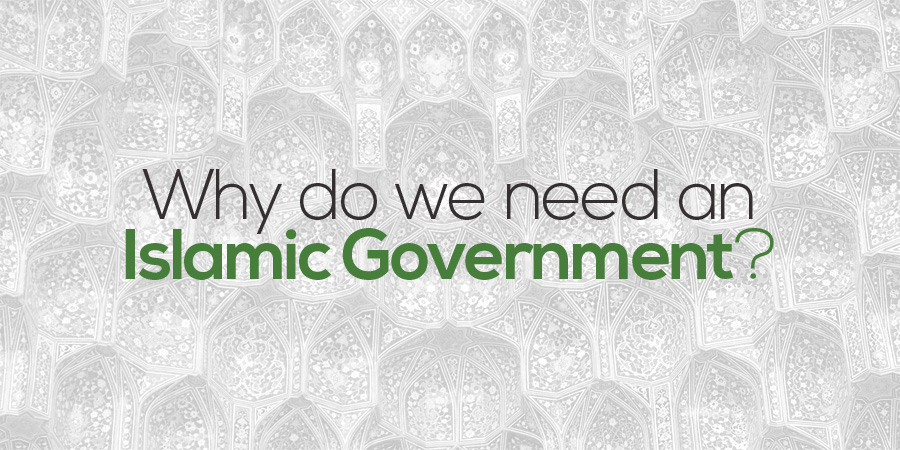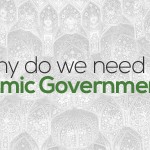Why Do We Need an Islamic Government? (2)

In order to clarify the matter further, let us pose the following question. From the time of the Lesser Occultation1 down to the present (a period of more than twelve centuries that may continue for hundreds of millennia if it is not appropriate for the Occulted Imām to manifest himself), is it proper that the laws of Islam be cast aside and remain unexecuted, so that everyone acts as he pleases and anarchy prevails? Were the laws that the Prophet of Islam labored so hard for twenty-three years to set forth, promulgate, and execute valid only for a limited period of time? Was everything pertaining to Islam meant to be abandoned after the Lesser Occultation? Anyone who believes so, or voices such a belief, is worse situated than the person who believes and proclaims that Islam has been superseded or abrogated by another supposed revelation.2
No one can say it is no longer necessary to defend the frontiers and the territorial integrity of the Islamic homeland; that taxes such as the jizyah, kharāj, khums, and zakāt3 should no longer be collected; that the penal code of Islam, with its provisions for the payment of blood money and the exacting of requital, should be suspended. Any person who claims that the formation of an Islamic government is not necessary implicitly denies the necessity for the implementation of Islamic law, the universality and comprehensiveness of that law, and the eternal validity of the faith itself.
After the death of the Most Noble Messenger (s), none of the Muslims doubted the necessity for government. No one said: “We no longer need a government”. No one was heard to say anything of the kind. There was unanimous agreement concerning the necessity for government. There was disagreement only as to which person should assume responsibility for government and head the state. Government, therefore, was established after the Prophet (s), both in the time of the caliphs and in that of the Commander of the Faithful (‘a); an apparatus of government came into existence with administrative and executive organs.
The nature and character of Islamic law and the divine ordinances of the sharī‘ah furnish additional proof of the necessity for establishing government, for they indicate that the laws were laid down for the purpose of creating a state and administering the political, economic and cultural affairs of society.
Firstly, the laws of the sharī‘ah embrace a diverse body of laws and regulation, which amounts to a complete social system. In this system of laws, all the needs of man have been met: his dealings with his neighbors, fellow citizens, and clan, as well as children and relatives; the concerns of private and marital life; regulations concerning war and peace and intercourse with other nations; penal and commercial law; and regulations pertaining to trade, industry and agriculture. Islamic law contains provisions relating to the preliminaries of marriage and the form in which it should be contracted, and others relating to the development of the embryo in the womb, and what food the parents should eat at the time of conception.
It further stipulates the duties that are incumbent upon them while the infant is being suckled, and specifies how the child should be reared, and how the husband and the wife should relate to each other and to their children. Islam provides laws and instructions for all of these matters, aiming, as it does, to produce integrated and virtuous human beings who are walking embodiments of the law, or to put it differently, the law’s voluntary and instinctive executors.
It is obvious, then, how much care Islam devotes to government and the political and economic relations of society, with goal of creating conditions conducive to the production of morally upright and virtuous human beings.
The Glorious Qur’an and the Sunnah contain all the laws and ordinances man needs in order to attain happiness and the perfection of his state. The book al–Kāfi4 has a chapter entitled, “All the Needs of Men Are Set Out in the Book and the Sunnah,”5 the “Book” meaning the Qur’an, which is, in its own words, “an exposition of all things.”6 According to certain traditions, the Imām7 also swears that the Book and the Sunnah contain without a doubt all that men need.
Second, if we examine closely the nature and character of the provisions of the law, we realize that their execution and implementation depend upon the formation of a government, and that it is impossible to fulfill the duty of executing God’s commands without there being established properly comprehensive administrative and executive organs.
Thus, the taxes Islam levies and the form of budget it has established are not merely for the sake of providing subsistence to the poor or feeding the indigent among the descendants of the Prophet (s); they are also intended to make possible, the establishment of a great government and to assure its essential expenditures.
Source: Islamic Government, Imām Khomeini
References:
- Lesser Occultation: ghaybat-i sughrah, the period of about 70 years (260/872-329/939) when, according to Shī‘i belief, Muhammad al-Mahdi, the Twelfth Imām, absented himself from the physical plane but remained in communication with his followers through a succession of four appointed deputies, viz., ‘Uthmān ibn Sa‘īd, Muhammad ibn ‘Uthmān, Husayn ibn Rūh, and ‘Ali ibn Muhammad. At the death of the fourth deputies no successor was named, and the Greater Occultation (ghaybat-i kubrah) began, and continues to this day. See Muhammad Bāqir as-Sadr and Murtadā Mutahhari, Awaited Saviour (Karachi: Islamic Seminary Publications), http://www.islam.org/saviour/index.htm; Muhammad Bāqir as-Sadr, An Inquiry Concerning Al-Mahdi (Qum: Ansariyan Publications); Jassim M. Husain, The Occultation of the Twelfth Imām: A Historical Background (London: Muhammadi Trust, 1982); Ibrāhīm Amīni, Al-Imām Al-Mahdī: The Just Leader of Humanity, trans. ‘Abdul ‘Azīz Sachedina (Qum: Ansariyan Publications), http://www.al-islam.org/mahdi/nontl/index.htm. (Pub.)
- The allusion is probably to the Bahā’is, who claim to have received a succession of post-Qur’anic revelations.
- Jizyah: a tax levied on non-Muslim citizens of the Muslim state in exchange for the protection they receive and in lieu of the taxes, such as zakāt, that only Muslims pay. Kharaj: a tax levied on certain categories of land. Khums: a tax consisting of one-fifth of agricultural and commercial profits (see p. 24 and Sayyid Muhammad Rizvi, Khums, http://www.al-islam.org/beliefs/practices/khums.html). Zakāt: the tax levied on various categories of wealth and spent on the purposes specified in Qur’an, 9:60. (Pub.)
- Al-Kāfi: more fully, Al-Kāfi fī ’l Hadīth,one of the most important Shī‘i collections of hadīth, compiled by Shaykh Abū Ja‘far Muhammad ibn Ya‘qūb al-Kulayni (d. 329/941). This treatise consists of 34 books, 326 sections, and over 16,000 ahādīth. Two fascicules of this work have been translated into English by Sayyid Muhammad Hasan Rizvi and published by the Tehran-based World Organization for Islamic Services (WOFIS), http://www.wofis.com, e-mail: wofis@wofis.com. (Pub.)
- Usūl al-Kāfi, Book of “Virtues of Knowledge,” vol. 1, pp. 76-80. (Pub.)
- Qur’an, 16:89.
- The reference is probably to Imām Ja‘far as-Sādiq, whose sayings on this subject are quoted by ‘Allāmah Tabātabā’i in al-Mīzān fī Tafsīr al-Qur’ān (Beirut, 1390/1979), XII, 327-328. First eight volumes of ‘Allāmah Tabātabā’i’s Al-Mīzān has been translated into English by Sayyid Saeed Akhtar Rizvi and published by the WOFIS. (Pub.)

